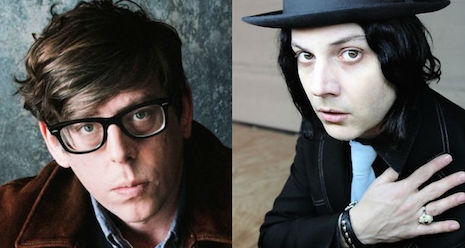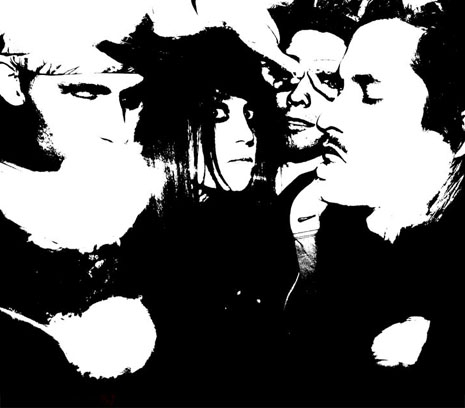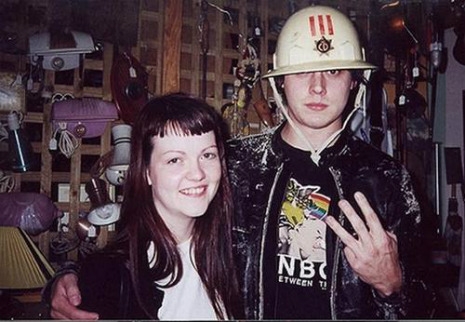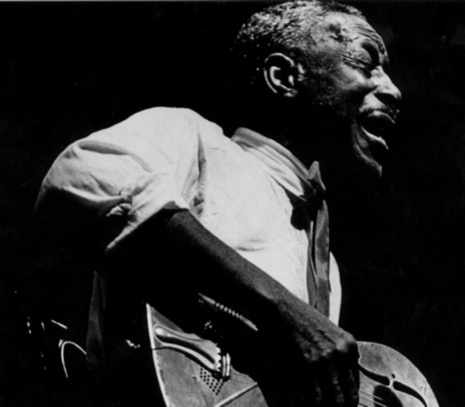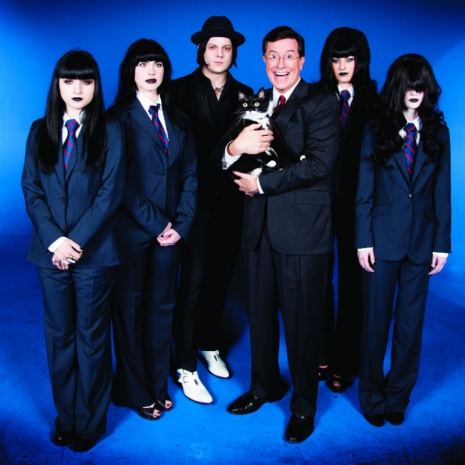
The “Blue Series” started in 2009 with the simple idea of a continuing series of 7-inch singles to be released via Jack White’s Third Man Records label. Each artist/group would be given just 24 hours notice, the music would be recorded in the same studio (at Jack White’s house), the songs would all be produced by Jack and the cover photo would be the performer(s) in front of the blue wall in the Blue Room at Third Man’s Nashville offices.
From that sprung 40 releases spanning every sort of style and genre and all pressed at the same local pressing plant. The beautifully-published new book The Blue Series: The Story Behind the Color is an extensive 282-page oral history of the project presented in a hardback slipcase-clad volume featuring a series of interviews conducted with the Blue Series’ many contributors giving a lot of insight into how these spontaneous recordings came to be. This excerpt with one of the series’ more surprising participants can be read in full in the pages of The Story Behind the Color. Courtesy of editor Ben Blackwell and Third Man Books.
Ben Blackwell writes:
While his team was always assuring me otherwise, I never really thought Stephen Colbert would have the time to speak to me. The onset of our conversation was probably the only time in the writing of the book where I was legitimately nervous. But he’s so easy to talk to, so affable…he SPEAKS for a living and that’s a great asset to have in an interview. By the time we landed on Neutral Milk Hotel I’d just thrown that in there out of personal interest, yet THAT part of the interview became one of my favorite parts of the entire book. I don’t know if he’s ever explained so in-depth his appreciation for the band.
BEN BLACKWELL: This is Ben Blackwell from Third Man Records.
STEPHEN COLBERT: Hey! How are ya?
BLACKWELL: I’m good, how are you doing?
COLBERT: Doing just dandy.
BLACKWELL: That’s just great. Are you a big fan of Black Oak Arkansas and Jim Dandy the lead singer?
COLBERT: Of course I am. Of course I am.
BLACKWELL: So yeah, I’m calling to talk about the wonderful recording experience you had a couple years back when you came down here to Nashville.
COLBERT: Yeah!
BLACKWELL: So I guess where does your memory bring you in terms of how all this came about? Where did the idea spring from?
COLBERT: Well we were fans of Jack, and one of my producers, a guy named Aaron Cohen, came to me — he was also one of my writer/ producers who also was always making music recommendations to me, so he always came in with his music ideas — and he goes, “would you wanna go, would you wanna record something with Jack White at Third Man Records?” And I said “Yeah, sounds great!” And he goes, “We’d have to go to Nashville,” and I went, “I don’t know about that,” because traveling was difficult — we had to do a show every day. And he goes, “No it will be fun, please, let’s go. It’s supposed to be like a musical playground down there.” And I said, “Alright, sure, I’ll give it a shot. What are we doing?” “Oh we’ll do a sequel to ‘Charlene,’” and I said “That will be fun.” And I don’t think… I can’t remember if we had Jack on the show yet, I can’t remember if we had him on yet because I know evidently we had a show where we did something a little different, he didn’t want to be interviewed.
BLACKWELL: I don’t think you did from my recollection.
COLBERT: Ok. He’s pleasantly difficult, is how I would describe Jack. A difficult that leads to creativity because you have to find a new way to talk to him or play with him and it’s always fun, because he’s particular about the way he likes to do things, which I respect. And so, I said “sure,” that was it. Just one of my producers was a fan of Jack’s and he knew that I liked Jack and The White Stripes and I said “sure let’s give it a shot.” But I didn’t know what to expect at all.
BLACKWELL: Do you have any recollection — I remember back in, whenever it was, 2005 or so, at some point in the lead up to your show —
COLBERT: — Oh shit, yeah! Ok so here’s the deal: Jack agreed to do our theme song, the original song, and listen, I didn’t have the original conversation with Jack. It was Ben Carlin, one of my old execs, and he goes, “Hey, Jack White said he’s up for doing our theme song.” And I’m like, “Oh that sounds fantastic! That’s great!” And the closer we got, the less it seemed like it was gonna happen so Jack finally said like, “I just don’t have time. I know you guys are coming up, I wanna do it, I just don’t have time.” And I had always thought that — I was very excited that Jack wanted to do it — but I hadn’t actually reached out to Jack because I didn’t know him. And I was always like, I kinda felt like we were gonna go with Cheap Trick and my exec was like, “Would Jack White be fine too?” And I’m like, “Yeah sure.” It was just another thing I didn’t want on my plate. And I was thrilled it was gonna be Jack, and then I found out he couldn’t do it and I was like, “Man, fuck Jack White!” And then I was like, well let’s go with what I wanted. Then we went with Cheap Trick and had a great time. But yeah, Jack was originally gonna do the theme song.
BLACKWELL: And Rick Nielsen has since made millions off of your theme song.
COLBERT: God I hope so.
BLACKWELL: I remember being with Jack at the time and him saying, “Yeah I’m gonna do the theme song for this new Stephen Colbert show.” Oh wow, that sounds pretty cool. And not hearing anything from him between when he said that and I was watching the first episode going like, “can’t wait to see what Jack did! Ehhh this doesn’t really sound like Jack.”
COLBERT: [laughs] Does not sound like him, no. And that was my original thought. Because I had totally forgotten about that. So when they said do you wanna do something with Jack White. I was like “I’d like to plan to do something with Jack White” —
BLACKWELL: So you had to travel down here, you guys— you and a bunch of your writers — kind of started sketching out the idea of the song. Was there a little bit of back and forth? You guys came up with lyrics and —
COLBERT: Yeah, what would the next version of the song be …
BLACKWELL: Right. You guys didn’t do any of the music part at all, right? You guys just only focused on lyrics?
COLBERT: Yeah, I think so we just did the lyrics and Jack came through with the music, I think that’s how it worked.
BLACKWELL: Right. And how did you feel about that, did that feel all in concert with the interview and the actual filming or did you view it as two separate, but connected, parts?
COLBERT: Well the funny thing was, the interview that I did with Jack, felt so different from almost any other interview I’ve ever done because it was all just about music and Catholicism. Those two subjects that we talked about. And he’s got an irascible nature, and it was such wonderful friction to go up against. Because you really want somebody to resist you in an interview situation. So you have some place for sparks to happen. And he’s all either flint or steel. I’m not sure which one it is. So there are so many sparks, even if — think I was like, “What’s your favorite Bob Seger song?” And he’s like, “excuse me?” I’m like “C’mon, Seeg?” And it’s time for the comeback. “What’s your favorite Seger song? Don’t tell me you don’t have one. Don’t tell me you don’t have a favorite.” And in some ways I’m fucking with him but it was kind of sincere. I ran my interview with him, but the song is totally in character. The song’s totally in character. But I was doing the interview with one of the early examples of like, this is what I would be like if I could just interview people not in character. Because yeah, I was fucking with him but just like a comedian, but it was entirely enjoyable just to spend time with someone as opinionated and as, oddly, both opinionated and reticent at the same time. Having to pry answers out of him at times and almost entirely be combative, but seeing that he would enjoy it, it was such a joy to do. So the interview was totally not the song. The process of the song was, let’s complete this character game that we created in the first months of the show when the character was very tightly wound. And the interview was the loosest one I’ve ever done up until that point. Even though I was, I had a game of just messing with him. So, yeah, they were very different.
BLACKWELL: You had said, at some point you said to someone, that Stephen Colbert, the character, and Stephen Colbert, the person, are both huge fans of Bob Seger.
COLBERT: Yeah that’s true.
BLACKWELL: And do you recall at the time that Bob Seger was actually in Nashville?
COLBERT: He was?
BLACKWELL: He was in Nashville and it seemed like we almost got him down to appear on-screen to play one of those nights you were filming here.
COLBERT: [laughs] I remember something like that. I actually ran into Seger about a month ago.
BLACKWELL: Oh nice!
COLBERT: I had never met him before, but I was at the Kennedy Center Honors and he was there to sing “Heartache Tonight” for the Eagles, which I guess he co-wrote with Don Henley. I think it was Henley he wrote it with. With Glen Frey, he co-wrote it with Glen Frey. And we were seated next to each other at the actual award ceremony at the White House. He leans forward around his wife and goes, “Heyyyy,” and I said, “Oh man! So nice to finally meet you.” And he goes, “I saw your thing with Jack. Really liked it, man. We were playing it around the office a lot.” And so that was a real joy. I’m still waiting for the re-Segerence. I know he’s never going anywhere and he’s still been around but somebody needs to do a movie with an entire soundtrack of just Seger. But let’s get back to Jack.
BLACKWELL: Well, we’ve been working on it since, at least since then to try to reissue some of that stuff. But that’s another story. So the whole Catholic throwdown thing, you talk about the interview being nothing but talking about music and Catholicism — my side question becomes, you have a — I remember preceding this Jack said it’s really hard to be interviewed by you because first of all, it’s not a traditional interview. Second of all, you actually need to come in with an approach as maybe you dealt with a lot of people who were trying to be funny in response to you? And maybe a lot of people weren’t coming in thinking no you actually need to dial it back and Stephen’s the funny one and you need to be the straight guy. Did that feel at play with that conversation at all?
COLBERT: No, I didn’t feel that at all. Not with Jack at all. He was very — I mean, I don’t know what he’s like to people who have known him for a long time, but he’s got a combative nature — at least when I talked to him — and he’s also got a little bit of “oh you’re not so great. You’re not so great. Why are you such a big fucking deal?” And so it’s like, “Oh you’re not the biggest Catholic, I’m the biggest Catholic.” You know? [laughs] He wouldn’t give me an inch. And my character is usually very high status. And just like having a TV show is very high status. And he wouldn’t give me the status. Which was always fun. It ended up being the status game. The status game evolved very quickly into specifically the Catholic status game. Who could stump the other person. I don’t even remember how we got to the first question about it.
BLACKWELL: He asked you how to spell your name.
Continues after the jump…







